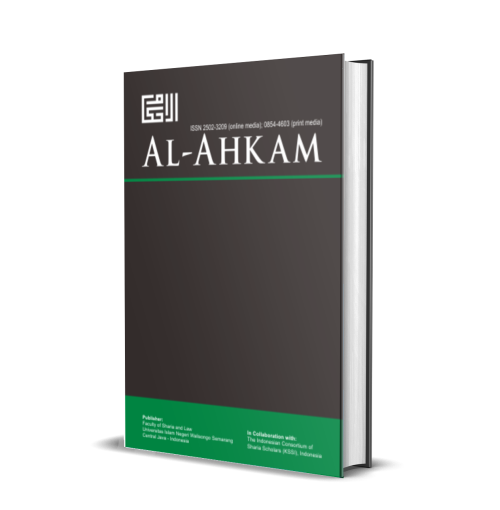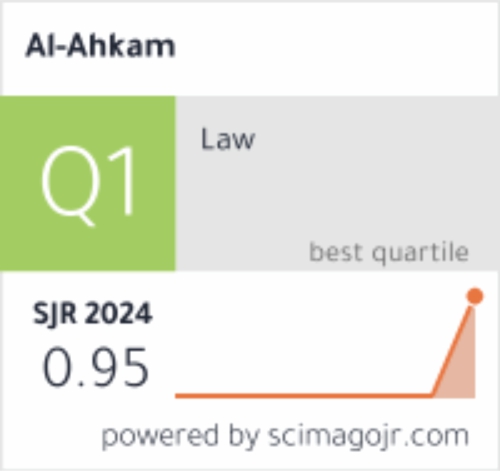Human Rights in Maqāṣid al-Sharī’ah al-Āmmah: A Perspective of Ibn ‘Āshūr
DOI:
https://doi.org/10.21580/ahkam.2022.32.1.9306Keywords:
Ibn ‘Āshūr, human rights, human nature, maqāṣid al-sharī’ah al-āmmahAbstract
Sharī’ah is aimed for the goodness of mankind. By extrapolating the evidence from Qur'an and Sunnah. Islamic sharī’ah is believed to be the rules and objectives for the general interest of society and individuals. This paper focuses on the study of the concept of the nature of human rights in the view of Ibn ‘Āshūr in terms of the maqāṣid al-sharī’ah al-āmmah theory. The study is a kind of library research where the researcher collected the library data by reading books or magazines and other sources to collect data from various literatures. He used a qualitative approach by revealing the meaning of information or empirical data obtained from books, scientific or official research reports and from other literatures. This study, finally, found two results. First, there were found all characteristics of the law, the general purpose, and the meaning of sharī’ah as a whole. Second, it was found the meaning of law combined with four epistemological frameworks, namely: al-fiṭrah (religious instinct), al-samāḥah (tolerance), al-musāwah (egalitarian), and al-ḥurriyah (freedom of action). In the legality of al-maqāṣid law, this research contributes to the human rights of Ibn ‘Āshūr’s ijtihād which becomes the principle of humanity.Downloads
References
Abd. Kholiq Hasan. Belajar Mudah Maqasid al-Syariah. Jombang: Laibafa Press, 2020.
‘Āshūr, Muḥammad Al-Ṭāhir Ibn. Kashf al-Mughaṭṭā min al-Ma’ānī wa al-Alfāẓ al-Wāqi’ah fī al-Muwaṭṭā’. Cairo: Dār al-Salām, 2006.
———. Maqāṣid al-Sharī’ah al-Islāmiyyah. Tunisia: Dār al-Salām, 1972.
———. Maqāṣid al-Sharī’ah al-Islāmiyyah. Jordania: Dār al-Nafā’is, 2001.
’Aṭiyyah, Jammāl al-Dīn Muḥammad. Naḥwa Taf’īl Maqāṣid al-Sharī’ah. Damaskus: Dār al-Fikr, 2003.
Capra, Fritjof. The Turning Point Science, Society, and the Rising Culture. New York: Bantam, 1984.
Farih, Amin. “Reinterpretasi Maṣlaḥah sebagai Metode Istinbāṭ Hukum Islam: Studi Pemikiran Hukum Islam Abū Isḥāq Ibrāhīm Al-Shāṭibī.” Al-Ahkam 25, no. 1 (April 25, 2015): 43. https://doi.org/10.21580/ahkam.2015.1.25.193.
Al-Gālī. Shaykh Al-Jāmi’ Al-A’ẓam Muḥammad al-Ṭāhir Ibn ’Āshur: Hayātuh wa Āthāruh. Beirut: Dār Ibn Ḥazm, 1996.
Hāmid, Yūsūf, and Al-Āmīn. Al-Maqāṣid al-’Āmmah li al-Sharī’ah al-Islāmiyyah. Cairo: IIIT, 1994.
Al-Ḥasanī, Ismā’īl. Naẓariyyah al-Maqāshid 'ind al-Imām Muḥammad al-Ṭāhir Ibn ’Āshur. Cairo: IIIT, 1995.
Iryani, Eva. “Hukum Islam, Demokrasi dan Hak Asasi Manusia.” Jurnal Ilmiah Universitas Batanghari Jambi 17, no. 2 (2017): 24–31.
Kasdi, Abdurrahman. “Maqashid Syari’ah dan Hak Asasi Manusia: Implementasi HAM dalam Pemikiran Islam.” Jurnal Penelitian 8, no. 2 (2014): 247–68.
Kurniawan, Robby. “Maqasid Syariah dan Pembangunan Hak Asasi Manusia.” Al-Mazahib: Jurnal Perbandingan Hukum 6, no. 2 (2018): 227–51.
Mahmud. Metode Penelitian Pendidikan. Bandung: Pustaka Setia, 2011.
Mohammad Fauzan Ni’ami Bustamin. “Maqāṣid al-Syarī’ah dalam Tinjauan Pemikiran Ibnu Asyur dan Jaser Auda.” Jurnal Ilmiah Syari‘ah, Volume 20, Nomor 1, (Januari-Juni), 2021.
Moleong, Lexy J. Metodologi Kualitatif. Bandung: Remaja Rosdakarya, 2009.
Muhtamiroh, Siti. “Muhammad Thahir Bin ’Asyur dan Pemikirannya tentang Maqashid al-Syari’ah.” At-Taqaddum 5, no. 2 (2013): 253–72. https://doi.org/DOI: 10.21580/at.v5i2.698.
Muladi. Hak Asasi Manusia Hakekat, Konsep dan Implikasinya dalam Perspektif Hukum dan Masyarakat. Cet. 1. Bandung: PT Refika Aditama, 2009.
Musolli. “Maqasid Syariah: Kajian Teoritis dan Aplikatif pada Isu-Isu Kontemporer.” Al-Turas: Jurnal Studi Keislaman 5, no. 1 (2018): 60–81. https://doi.org/10.33650/at-turas.v5i1.324.
Musyaffa’, Fadlolan. “Kajian Tafsir Al-Jalalain Surat An-Nisa Ayat 84-87.” September 2021.
Nikmah, Lutfiyatun. “Penafsiran Ṭāhir Ibn ‘Āshūr Tafsir Ayat tentang Demokrasi: Kajian Tafsir al-Taḥrīr wa al-Tanwīr.” Journal of Islamic Studies and Humanities 2, no. 1 (2017). https://doi.org/DOI: 10.21580/jish.21.2517.
Permana, Rahmad Hidayatullah. “Bukan Pertama Kali Vanuatu Rutin Serang Indonesia Soal Papua di PBB.” DetikNews, September 27, 2020. https://news.detik.com/internasional/d-5190210/bukan-pertama-kali-vanuatu-rutin-serang-indonesia-soal-papua-di-pbb.
Al-Rāzī, Fakhr al-Dīn. Al-Tafsīr al-Kabīr. I. Vol. 1. Beirūt: Dar al-Kutub al-‘Ilmiyyah, 1990.
Rosyid, Maskur, and M. Nurul Irfan. “Reading Fatwas of MUI a Perspective of Maslahah Concept.” Syariah: Jurnal Hukum dan Pemikiran 19, no. 1 (June 2, 2019): 91–117.
Al-Shāṭibī, Abū Isḥāq. Al-Muwāfaqāt. Beirūt: Dār al-Ma’rifah, 1975.
Sugiyono. Metode Penelitian Pendidikan. Bandung: Alfabeta, 2012.
Al-Suyūṭī, Jalāl al-Dīn. Al-Ashbāh wa al-Naẓā’ir. Cairo: Dār al-Ghād al-Jadīd, 2017.
Syahrul Sidiq. “Maqasid Syari’ah & Tantangan Modernitas: Sebuah Telaah Pemikiran Jasser Auda.” Jurnal Agama Dan Hak Azazi Manusia, Vol. 7, No. 1. November, 2017, 21.
Tajrid, Amir. “Tracing the Genealogy of Maqāṣid Al- Sharī’ah Concept : A Historical Approach.” Al-Ahkam 31, no. 1 (2021): 69–90. https://doi.org/10.21580/ahkam.2021.31.1.6696.
Tim ICCE UIN Jakarta. Demokrasi, Hak Asasi Manusia, dan Masyarakat Madani. Jakarta: Prenadamedia Group, 2003.
Tim Penulis UII. Pribumisasi Hukum Islam: Pembacaan Kontemporer Hukum Islam di Indonesia. Yogyakarta: PPs FIAI UII, 2012.
‘Ubaydī, Hammādī. Al-Shāṭibī wa Maqāṣid al-Sharī’ah. Beirut: Dār Qutaybah, 1992.
Ubaedillah, A., and Abdul Rozak. Pancasila, Demokrasi, HAM, dan Masyarakat Madani. Jakarta: ICCE UIN Syarif Hidayatullah and Prenadamedia Group, 2003.
Umi Kulsum. “Konstelasi Islam Wasatiyah dan Pancasila serta Urgensinya dalam Bernegara Perspektif.” Journal of Islamic Civilization Volume 2, (2020).
Yaqin, Ainol. “Yūsuf Al-Qarḍāwī’s Istinbāṭ Method and Its Implementation in the Moderation of Islamic Law.” Al-Ahkam 31, no. 1 (April 29, 2021): 109–40. https://doi.org/10.21580/AHKAM.2021.31.1.7075.
Downloads
Published
How to Cite
Issue
Section
License
By submitting an article to the journal, the author(s) agree to transfer the published article's copyright to the journal, which will act as the publisher. This means the journal will have the right to publish the article in various forms, including reprints. The journal will maintain the publishing rights to the published articles.
In line with the license, authors and third parties (readers, researchers, and others) are allowed to share and adapt the material. In addition, the material must be given appropriate credit, provided with a link to the license, and indicated if changes were made. If authors remix, transform or build upon the material, authors must distribute their contributions under the same license as the original.



